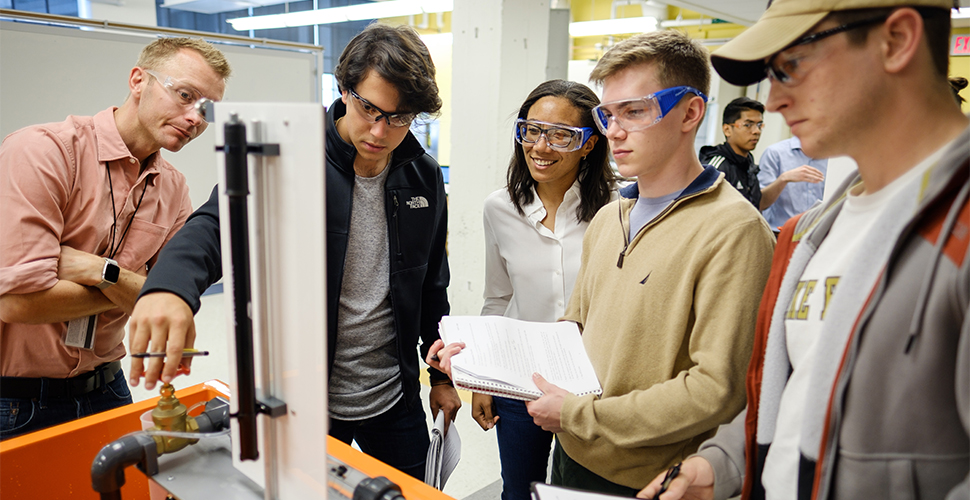Wake Forest’s engineering program builds upon a culture of inclusivity
As its first group of engineering students declared their major this year, Wake Forest University achieved something that few, if any, programs have anywhere – a student body that more accurately represents the U.S. population.
And that’s vital to creating an engineering industry that seeks solutions to the problems of all people as a matter of course, said Olga Pierrakos, founding department chair of Wake Forest’s engineering program.
“Engineering really has not been a profession that has been accessible to everyone,” Pierrakos said.
“Engineering exists to help people, to make processes more practical and user friendly. To do that, our engineers have to come from a variety of backgrounds.” Olga Pierrakos
Two years after the engineering program opened its doors at Wake Downtown, 46 students have declared engineering as a major. The founding cohort had 54 students when they enrolled as first-year students, and there were 90 new first-year students this past academic year. First-year to second-year retention is at 80 percent – well above the 40-60 percent average at universities nationwide.
Wake Forest is uniquely positioned as having the only engineering program with undergraduates only in the U.S. to offer a bachelor of science degree in engineering grounded in liberal arts at a research university. Students find that the connection between departments and disciplines enriches their study.
“My friends at other universities are separated into the business school or the engineering school, but I get to be in classes with students who have no intent of pursuing the sciences in any way,” said Marguerite Walk (’21) of New Orleans, an engineering major with a minor in entrepreneurship.
“The liberal arts approach to engineering teaches engineers how to communicate with anyone and to understand their perspective. These communication skills allow engineers to collaborate with a variety of professions to solve problems.” Marguerite Walk (’21)
Of all the students currently enrolled in the engineering program:
- 42 percent are women. The national average is 17 percent; the U.S. population is 50 percent.
- 20 percent are members of underrepresented groups. The national average is 5 percent; the U.S. population is 23.4 percent.
Pierrakos said Wake Forest has built the engineering program to attract and retain a diverse student population, so the breadth of backgrounds represented in the inaugural class of majors has been satisfying. The drivers behind the success are a diverse faculty and an appealing liberal arts curriculum.
With increasing student enrollment, Wake Forest’s engineering faculty diversity also is growing. Including the faculty members joining this summer, 60 percent are women, while the national average is 10 percent. That’s a significant factor for attracting and retaining all students, but particularly women and underrepresented groups, research has shown.

The department has hired five new faculty members for the fall semester, and the job application is the first clue that this program is different: “We seek a colleague who is excited about building a new program that embodies the values of empowerment, integrity, inclusion, compassion, growth, and joy in every layer of our fabric.” That fabric includes faculty-student interactions, faculty-to-faculty interactions, curriculum development and space design.
“They’ve started off with the message that they want this to be an inclusive program,” said Regan O’Donnell (’21), a rising junior from Cohasset, Mass., who declared an engineering major and biology minor this year. “The learning environment is innovative and inspiring, and there is a collaborative atmosphere.”
She said the project-based focus of the curriculum helps students understand the whole engineering process, not just the math and science behind engineering.
Dayton Diemel (’21) of Hudson, Wis., is one of the older students in the inaugural cohort of engineering majors. As a junior, he switched his major to engineering and will stay at Wake Forest for five years so he can get an engineering degree, concentrating on structural engineering applications with a minor in economics. He wants to work in the management side of engineering, so he said the Wake Forest program is the perfect place for him.
“We’re learning about different types of engineering in different ways so we can be the communicators and translators for the science.” Dayton Diemel (’21)
“I love the people aspect. I love the communication that comes with business,” Diemel said.
Graduating this inaugural class of engineering majors is an important step in receiving accreditation from ABET, the organization that evaluates engineering programs at the bachelor’s and master’s degree level.
Pierrakos said she also feels a responsibility to prepare her students for a real-world working environment that might not align with who they are. Mentoring students on how to react to bias, and remain in engineering, will be significant part of the next two years.
“We’re leading on the education front in producing a new kind of engineer,” she said. “To what extent is the real world and the engineering workforce ready for them?”
Categories: Inclusive Excellence, Research & Discovery
